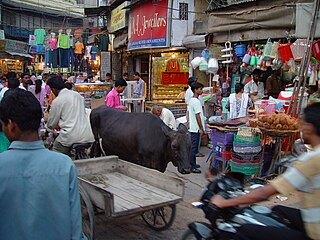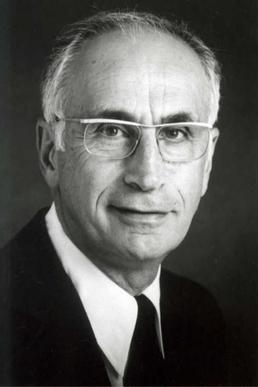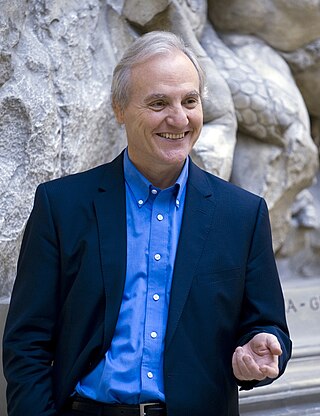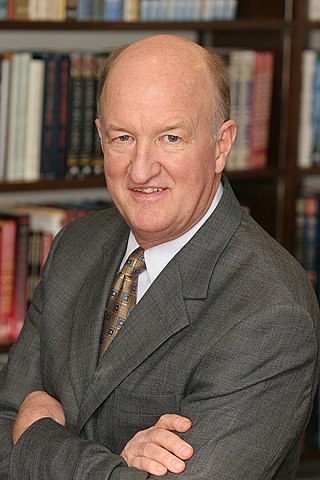Academic career
Smith's first teaching post was at the Krannert School of Management, Purdue University, which he held from 1955 until 1967, attaining the rank of full professor. [2]
Smith also taught as a visiting associate professor at Stanford University (1961–1962) and there made contact with Sidney Siegel, who was also doing work in experimental economics. Smith moved with his family to Massachusetts and got a position first at Brown University (1967–1968) and then at the University of Massachusetts (1968–1972). Smith also received appointments at the Center for Advanced Study in the Behavioral Sciences (1972–1973) and Caltech (1973–1975). [2]
Much of the research that earned Smith the Nobel Memorial Prize in Economic Sciences was conducted at the University of Arizona between 1976 and 2001. In 2001, Smith left Arizona for George Mason University. [11] From 2003 to 2006, he held the Rasmuson Chair of Economics at the University of Alaska Anchorage. [12] [13] In 2008, Smith founded the Economic Science Institute at Chapman University in Orange, California. [14]
Smith has served on the board of editors of the American Economic Review , the Cato Journal , Journal of Economic Behavior and Organization , Science, Economic Theory , Economic Design, and the Journal of Economic Methodology . [7] He also served as an expert for the Copenhagen Consensus. [15]
Academic work
Smith began his work in experimental economics at Purdue University. As Smith describes it:
In the Autumn semester, 1955, I taught Principles of Economics, and found it a challenge to convey basic microeconomic theory to students. Why/how could any market approximate a competitive equilibrium? I resolved that on the first day of class the following semester, I would try running a market experiment that would give the students an opportunity to experience an actual market, and me the opportunity to observe one in which I knew, but they did not know what were the alleged driving conditions of supply and demand in that market. [2]
In framing the experiment, Smith varied certain institutional parameters seen in the first classroom economics experiments as conducted by Edward Chamberlin: in particular, he ran the experiments for several trading periods, to give the student subjects time to train. [16]
At Caltech, Charles Plott encouraged Smith to formalize the methodology of experimental economics, which he did in two articles. In 1976, "Experimental Economics: Induced Value Theory" was published in the American Economic Review (AER). [17] It was the first articulation of the principle behind economic experiments. Six years later, these principles were expanded in "Microeconomic Systems as an Experimental Science," also in the AER. This paper adapts the principles of mechanism design, a microeconomic system developed by Leonid Hurwicz, to the development of economic experiments. In Hurwicz's formulation, a microeconomic system consists of an economic environment, an economic institution (or economic mechanism), and an economic outcome. The economic environment is simply the preferences of the people in the economy and the production capabilities of the firms in the economy. The key insight in this formulation is that the economic outcome can be affected by the economic institution. The mechanism design provides a formal means for tests of the performance of an economic institution, and experimental economics, as developed by Smith, provided a means for formal empirical assessment of the performance of economic institutions. The second main contribution of the paper is to the technique of induced values, the method used in controlled laboratory experiments in economics, political science, and psychology, which allows experimental economists to create a replica of a market in a laboratory. Subjects in an experiment are told that they can produce a "commodity" at a cost and then sell it to buyers. The seller earns the difference between the price received and its cost. Buyers are told that the commodity has a value to them when they consume it, and they earn the difference between the value of the commodity to them and its price. Using the technique, Smith and his coauthors have examined the performance of alternative trading mechanisms in resource allocation. [18]
In February 2011, Smith participated in the "Visiting Scholars Series" at the Nicholas Academic Centers in Santa Ana, California, conducted in collaboration with Chapman University. Smith and his colleague Bart Wilson conducted experiments designed to expose high school students from underserved neighborhoods to market dynamics and how concepts such as altruism influence economic behavior. [19]
Smith has authored or coauthored articles and books on capital theory, finance, natural resource economics and experimental economics. He was also one of the first to propose the combinatorial auction design, with Stephen J. Rassenti and Robert L. Bulfin in 1982. [20]
In January 2009, Smith signed a public petition opposing the passage of the American Recovery and Reinvestment Act. [21] In a 2010 Econ Journal Watch study, Smith was found to be one of the most active petition-signers among US economists. [22]
The Vernon Smith Prize for the Advancement of Austrian Economics is named after him and is sponsored by the European Center of Austrian Economics. [23]
Vernon Smith is renowned for his seminal contributions to the elucidation of spontaneous order [24] within the field of economics. He posits spontaneous order as the organic emergence of structure and coherence from apparent disorder, a phenomenon ubiquitously observed in both social and economic contexts. Smith has expounded upon the notion of spontaneous order in the context of his pedagogical endeavors as well. In his instructive course titled "Spontaneous Order and the Law" at the Fowler School of Law, Chapman University [25] , he illuminates how social norms and legal frameworks emerge organically through human interaction, gradually coalescing from apparent chaos into structured societal systems.
In recent years, Vernon L. Smith’s research has expanded to include the study of Neuroeconomics [26] as seen in Law & Neuroeconomics Smith (2000) [27] , where he integrates economic theory with neuroscience to understand decision-making processes. Vernon Smith’s work in this area has led to new insights into how brain activity influences economic decisions. Additionally, he has been instrumental in promoting the use of experimental methods in economics education, advocating for a hands-on approach to learning economic concepts. Some of these contributions were used in Neuroeconomics Lab [28] books published by Academic Press (2014).
Economics is a social science that studies the production, distribution, and consumption of goods and services.

Microeconomics is a branch of economics that studies the behavior of individuals and firms in making decisions regarding the allocation of scarce resources and the interactions among these individuals and firms. Microeconomics focuses on the study of individual markets, sectors, or industries as opposed to the national economy as a whole, which is studied in macroeconomics.
Behavioral economics is the study of the psychological, cognitive, emotional, cultural and social factors involved in the decisions of individuals or institutions, and how these decisions deviate from those implied by classical economic theory.
Experimental economics is the application of experimental methods to study economic questions. Data collected in experiments are used to estimate effect size, test the validity of economic theories, and illuminate market mechanisms. Economic experiments usually use cash to motivate subjects, in order to mimic real-world incentives. Experiments are used to help understand how and why markets and other exchange systems function as they do. Experimental economics have also expanded to understand institutions and the law.
Kevin McCabe is an American economist and economic theorist. He works in the fields of experimental economics, neuroeconomics and the study of human trust and decision making.

Armen Albert Alchian was an American economist. He spent almost his entire career at the University of California, Los Angeles (UCLA). A major microeconomic theorist, he is known as one of the founders of new institutional economics and widely acknowledged for his work on property rights.
Charles Raymond Plott is an American economist. He currently is Edward S. Harkness Professor of Economics and Political Science at the California Institute of Technology, Director, Laboratory for Experimental Economics and Political Science, and a pioneer in the field of experimental economics. His research is focused on the basic principles of process performance and the use of those principles in the design of new, decentralized processes to solve complex problems. Applications are found in mechanisms for allocating complex items such as the markets for pollution permits in Southern California, the FCC auction of licenses for Personal Communication Systems, the auctions for electric power in California, the allocation of landing rights at the major U.S. airports, access of private trains to public railway tracks, access to natural gas pipelines, the allocation of licenses for offshore aquaculture sites, the combinatorial sale of fleets of vehicles, and the application of complex procurements. Plott has contributed extensively to the development and application of a laboratory experimental methodology in the fields of economics and political science.

John August List is an American economist known for his work in establishing field experiments as a tool in empirical economic analysis. Since 2016, he has served as the Kenneth C. Griffin Distinguished Service Professor of Economics at the University of Chicago, where he was Chairman of the Department of Economics from 2012 to 2018. Since 2016, he has also served as Visiting Robert F. Hartsook Chair in Fundraising at the Lilly Family School of Philanthropy at Indiana University.
The goals of experimental finance are to understand human and market behavior in settings relevant to finance. Experiments are synthetic economic environments created by researchers specifically to answer research questions. This might involve, for example, establishing different market settings and environments to observe experimentally and analyze agents' behavior and the resulting characteristics of trading flows, information diffusion and aggregation, price setting mechanism and returns processes.

Ernst Fehr is an Austrian-Swiss behavioral economist and neuroeconomist and a Professor of Microeconomics and Experimental Economic Research, as well as the vice chairman of the Department of Economics at the University of Zürich, Switzerland. His research covers the areas of the evolution of human cooperation and sociality, in particular fairness, reciprocity and bounded rationality.

A combinatorial auction is a type of smart market in which participants can place bids on combinations of discrete heterogeneous items, or “packages”, rather than individual items or continuous quantities. These packages can be also called lots and the whole auction a multi-lot auction. Combinatorial auctions are applicable when bidders have non-additive valuations on bundles of items, that is, they value combinations of items more or less than the sum of the valuations of individual elements of the combination.

Mark Andrew Skousen is an American economist and writer. He currently teaches at Chapman University, where he is since 2022 a Doti-Spogli Chair in Free Enterprise at The George L. Argyros School of Business and Economics. He has previously taught at Columbia Business School, Mercy College, Barnard College, and Rollins College.
Robert Mark Isaac is an American academic who uses experimental economics to address basic microeconomic problems. His work has provided new empirical insights for many traditional economic problems, particularly cooperation and collective action problems.

Peter T. Leeson is an American economist and the Duncan Black Professor of Economics and Law at George Mason University. In 2012 Big Think listed him among "Eight of the World's Top Young Economists". He is a Fellow of the Royal Society of Arts.
Bart Wilson is an experimental economist. He holds the Donald P. Kennedy Endowed Chair of Economics and Law in the Chapman University, Argyros School of Business and Economics. He is also the director of the Smith Institute for Political Economy and Philosophy and teaches courses in humanomics. His work has been widely published in both the popular and academic press.
Peter L. Bossaerts is a Belgian-American economist. He is considered one of the pioneers and leading researchers in neuroeconomics and experimental finance.
Georg Heinrich von Weizsäcker is a German economist and currently the Professor for Microeconomic Theory and Applications at the Humboldt University of Berlin. His research interests include microeconomics, experimental economics, financial decision making, game theory and decision theory. In 2017, Weizsäcker's contributions to a better understanding of expectations formation and decisions under uncertainty were awarded the Gossen Prize.
Leeat Yariv is the Uwe E. Reinhardt Professor of Economics at Princeton University, a research fellow of CEPR, and a research associate of NBER. She received her Ph.D. from Harvard University and has held positions at UCLA and Caltech prior to her move to Princeton in 2017, where she is the founder and director of the Princeton Experimental Laboratory for the Social Sciences (PExL). Yariv's research focuses on political economy, market design, social and economic networks, and experimental economics.

Carlos Alós-Ferrer is a professor of decision and neuroeconomic theory at the University of Zurich and is currently the editor in chief of the Journal of Economic Psychology.

Aldo Rustichini is an Italian-born American economist, academic and researcher. He is a professor of economics at University of Minnesota, where is also associated with the Interdisciplinary Center for Cognitive Sciences.









